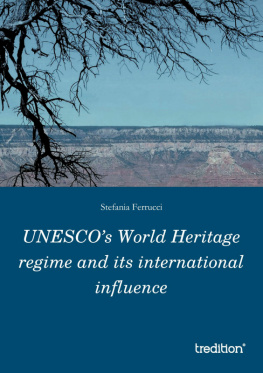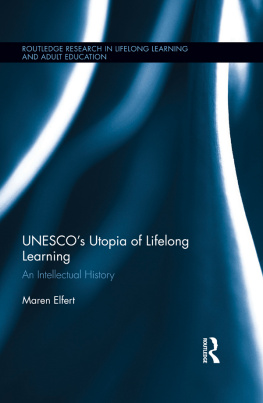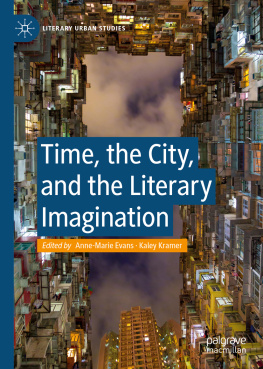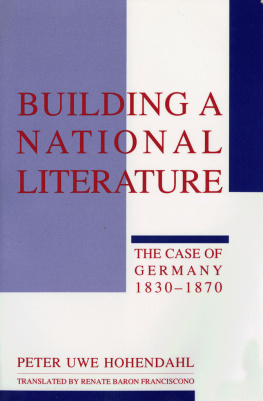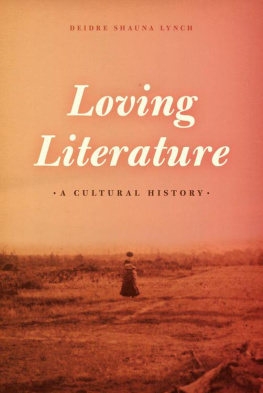
Loren Glass and Kate Marshall, Editors
Post45 Group, Editorial Committee
UNESCO and the Fate of the Literary
Sarah Brouillette
Stanford University Press
Stanford, California
STANFORD UNIVERSITY PRESS
Stanford, California
2019 by the Board of Trustees of the Leland Stanford Junior University.
All rights reserved.
No part of this book may be reproduced or transmitted in any form or by any means, electronic or mechanical, including photocopying and recording, or in any information storage or retrieval system without the prior written permission of Stanford University Press.
Printed in the United States of America on acid-free, archival-quality paper
Library of Congress Cataloging-in-Publication Data
Names: Brouillette, Sarah.
Title: UNESCO and the fate of the literary / Sarah Brouillette.
Description: Stanford, California : Stanford University Press, 2019. |
Series: Post45 | Includes bibliographical references and index.
Identifiers: LCCN 2018057613 (print) | LCCN 2018060097 (ebook) | ISBN 9781503609952 (cloth: alk. paper) | ISBN 9781503610316 (pbk. : alk. paper) | ISBN 9781503610323 (ebook)
Subjects: LCSH: LiteraturePhilosophyHistory. | UnescoHistory. | Books and readingInternational cooperationHistory. | Book industries and tradeInternational cooperationHistory. | Cultural policyEconomic aspectsHistory.
Classification: LCC PN45 (ebook) | LCC PN45 .B748 2019 (print) | DDC 801DC23
LC record available at https://lccn.loc.gov/2018057613
Cover design: Rob Ehle
Typeset by Kevin Barrett Kane in 10/15 Minion Pro
Contents
Acknowledgments
Research for this book was supported by the Social Sciences and Humanities Research Council of Canada and by grants and fellowships provided by Carleton University. At Carleton University I also have the good fortune to be supported by my excellent colleagues in the Department of English.
An earlier form of , also framed differently, appeared in Blind Field in August 2017.
I have always relied heavily on my research assistants. Recently, I have been lucky to work with Dessa Bayrock, Adam Benn, John Coleman, and Shaun Stevenson. David Thomas is always there. Allie Watson worked especially hard on the final stages. My friends, thank you.
I am grateful to other scholars who have informed and engaged with material in this book. They include Timothy Aubry, Mark Banks, Jasper Bernes, Joshua Clover, Amy DeAth, Arne DeBoever, Matt Hart, Tim Kreiner, Annie McClanahan, Mathias Nilges, Julianna Spahr, Emilio Sauri, and Michael Szalay.
In daily life, Travis DeCook supports me more than anyone else. He is a humble and courageous parent and scholar. I learn from his example, but not as much as I should.
At present I do not have the words to thank Grant Vogl. Fortunately, I have no doubt that there will be many more occasions.
Finally, this book is dedicated to a sweet child and my constant companion, Ben DeCooka boundless creative spirit, totally ungovernable.
Introduction
UNESCO, or the United Nations Educational, Scientific and Cultural Organization, is the most important global institution for cultural policy formation. Although it has often supported literary culture, its sheer institutional complexity and dizzying myriad of programs have no doubt deterred scholars of literature from engaging much with it. UNESCOs approaches to literature have always been fundamentally tied to the broad and complex conflicts at work within the organization, which are themselves inextricable from global economic and political conditions. UNESCO is both a product and an engine of liberal social policy. Something similar can be said of its relation to postwar literary culture, though with the proviso that the place of literature within liberal policy making has changed considerably over the course of the postwar period. That transformation is my concern here.
In its earliest years, UNESCO conscripted literature into the project of supporting liberal cosmopolitanism. It viewed the translation of classic literature as a contribution to the work of forging the strong cross-border bonds that were thought at the time to be integral to world peace. Subsequently, in the decolonizing 1960s and 1970s, illiteracy and a lack of access to literary books were lamented as a book hunger in the developing world, and the idea of reading as an unquestionably humanizing universal value was used to argue, though unsuccessfully, for a more balanced communications industry and copyright regime. Finally, in recent years, literature has been brought into the branding of cities and nations as a part of the heritage industry and as a tourism product associated with programming in the UNESCO Creative Cities Network. Now, UNESCO largely treats high literature as a commercially self-sustaining leisure product for wealthy, aging publics and unlikely to do much for people living in impoverished conditions.
The original role imagined for literature as helping to forge an enlightened global polity has not been entirely abandoned by policy makers. It is, however, no longer a programming priority. The idea that literature offers unique evidence of fundamental human dignity and particularity is still powerful, as is literatures association with values of care and attention. UNESCO now simply tends to treat this association as the habit of an elite niche. Serving readers hungry for books in underdeveloped markets is no longer treated as a viable goal for policy, and fundamental policy reform that might address uneven relations within global intellectual property creation is very much off the table. UNESCOs literary programming is highly suggestive in this context. A trajectory that may appear to be one of triumphant successliterary tourism and festival programming can be quite lucrative for some peopleis also, in a different light, a story of decline.
* * *
Tracing the history of UNESCOs support for literaturefrom liberalism through decolonizing left-liberalism to neoliberalism, if you likeis one way of grounding the critical discourse of world literature in the political economy of global literary institutions and markets. It is a way of analyzing the social forms in which we are ourselves participants and of avoiding approaches to the subject that are designed to console rather than politicize, within the setting of unfolding global crises of which literatures changed status is simply one minor sign. An economically focused version of cultural materialism, committed to examining the conditions of production of the literary cultural milieu, will be useful for this analysis. Yet we will venture significantly beyond the common delimitation of such inquiry to what Pierre Bourdieu describes as the field of cultural production, rooting our analysis of culture instead in a reckoning with the foundational structures of our societies. Whereas Bourdieusian theorists have extensively detailed the relations internal to a restricted literary field, considering how social class informs ones place in the cultural production system, this book emphasizes how cultural production emerges in relation to the real economy.
In emphasizing the real economy as a foundational context for the emergence and meaning of culture, I draw more from work on global economic turbulence and capitalist crises than from theories of the literary field.and, often, ways of thinking. Literature has often served as equipment for cultural policy making. It helps to shape the mentalities of cultural policy makers, and those policy makers in turn develop ways to use literature as an aid to their own progressive governance. Developments in the global economy are a constitutive frame for their policy discussions, but cultural policy rarely greets those developments happily. Instead, a wary grimace is often common, as policy makers imagine how they can intervene in, guide, and reform economic systems to better meet human needs. Transformations in postwar literary culture can be seen in a new light through attention to this policy imaginary, placed in relation to the shifting states of the global economy and the dominant ideologies and cultural policy directives attached to them.
Next page

